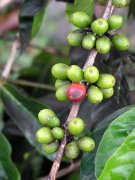Must you abstain from coffee for pregnancy and breastfeeding? Recommend organic decaffeinated coffee for pregnant women

Professional coffee knowledge exchange more coffee bean information please follow the coffee workshop (Wechat official account cafe_style)
The origin and development of decaf: why are all Swiss decaf sold?
Mothers who are pregnant or breastfeeding must have had the struggle of "want to drink but dare not drink" and "want to eat but dare not eat" struggle! Among these struggles, apart from junk food, coffee should be in the top three, especially now that coffee is basically a daily drink. I understand how painful it is to quit!
Interestingly, drinking coffee for both pregnancy and breastfeeding should be easily accessible information.
The NHS website states that "nursing mothers who drink caffeinated drinks such as coffee and tea may become addicted to their babies early through breast milk." A nursing mother's daily caffeine intake is limited to 750 milligrams, which is equivalent to two cups of cappuccino, and nursing mothers are advised not to drink alcohol. " (to be honest, the NHS's caffeine limit is much higher than I thought XD.)
Dr. Huang 𪻐 Ning's column "is it okay for mom to drink coffee and breastfeed?" "referring to" the results of various studies, it is generally recommended that pregnant women and nursing mothers consume less than 200 milligrams of caffeine a day, about one cup a day (below medium cup, not X Buck's giant cup). More than this concentration may increase the risk of miscarriage and increase the number of heartbeats and breaths of the baby. "
But it'seems that people still smell the coffee as if it were poison.
In fact, when I was lenient, there were a lot of taboos. It was certain that I didn't drink coffee, and I didn't eat any seafood with shells, which made the people around me nervous. Of course, when I was pregnant with Bobby, I raised the whole pig, and in the later stage, I decided to start drinking coffee, and I wanted to let him get used to caffeine since the fetus, so I didn't have to worry about him getting too high when I was breastfeeding. XD, I was totally persuading myself that I was so blind! Anyway, I went to Starbucks to buy decaf coffee first, but I thought that the cost of drinking it for a long time was so high that I couldn't keep it open, so I looked around, and I really found a decaf instant coffee, and it was organic. I've been breastfeeding for nine months from late pregnancy to now, and it's been as long as a year. Bobby didn't have any reaction because I drank coffee.
My method is to heat half a cup of fresh milk, add a little boiled water to the right amount of water, and pour 1.5 packets of coffee powder to make a delicious latte.
Of course, decaffeinated coffee is not so strong, but it's better than nothing, and you get used to it after drinking it for a long time. The point is that you can drink at ease, drink confidently and confidently, and you don't have to worry about affecting the baby. Otherwise, the guilt and guilt in your heart after stealing food you shouldn't eat is really uncomfortable-pregnancy and breastfeeding are hard enough, and we don't need to torture ourselves like this! (chest out--)
If you are still worried about the effect of drinking coffee on your baby, or if it does (everyone reacts differently to caffeine), the caffeine in breast milk will return to the normal concentration after about two hours, so you can squeeze out the milk this time after two hours, but it's too wasteful for me to do it, so I think I can drink coffee or any caffeinated food after milking or feeding. If you finish eating quickly, there should be more than three hours from the next milking or lactation, and the concentration of caffeine in breast milk should have returned to normal. But I'm drinking decaffeinated coffee now, and there's really no response to Bobby's long-term observation, so I don't actually pay special attention to the timing of caffeine intake.
Well, if you are really worried about the effect of caffeine on your baby, please rest assured that there are several non-caffeinated drinks available here, such as wheat tea, South African national treasure tea and fruit vinegar.
Finally, let me talk about a wonderful situation. I think we have all heard of this little recipe that drinking fresh milk tea can make milk, but there is also caffeine in fresh milk tea. there are still many people who continue to drink black tea, oolong tea and even green tea during pregnancy and lactation. The caffeine content of these teas may not be so low. I can't find a survey of caffeine content in Taiwan hand cup beverage shops. Only to find this survey of Hong Kong hand cup caffeine report, "the caffeine content of milk tea may be higher than coffee", the article mentioned that "the Hong Kong Centre for Food Safety today released the caffeine test results of desktop milk tea, including sunrise tea, 85C, CoCo tea and other beverage chains in Hong Kong. The average caffeine content of each cup of 400cc hand cup milk tea is about 110 400cc 160 mg. It contains more foam coffee than Starbucks and McDonald's, and drinking two to three cups of milk tea a day exceeds the European Union's recommendation of 300 milligrams a day for adults. "although it is a survey conducted in Hong Kong, I think the caffeine content of hand cups in Taiwan is not far away, and apart from caffeine, the sources of various raw materials and sugar are actually a bigger problem. (but I do drink, PUHHHHAHAHAHAHAHAHAHAHAHHHHHHHHHHHHAHAHAHAHAHAHAHAHAHAHAHAHAHAHAHAHAHAHAHAHAHAHAHAHAHAHAHAHAHAHAHAHAHHAHAHAHAHAHAHAHAHAHAHAHAHAHAHAHAHAHAHAHAHAHAHAHAHAHAHHAHAHAHAHAHAHHAHAHAHAHAHAHAHAHAHAHAHAHAH
I'm not advocating coffee, and I'm not working with coffee manufacturers, but if they read this article, they should thank me. Hello, welcome to cooperate XD (wave--)
Coffee is just an introduction. As long as I want to share the following idea through this sharing, there is no need to demonize coffee or any food, as long as it is generally believed to be edible. It can be consumed in moderation during pregnancy or breastfeeding (with the exception of alcohol and tobacco and raw food, raw food is prone to the risk of contracting E. coli). Of course, for the health of the mother and baby, we can eat less for these special foods during these special periods, or look for better food sources, such as organic, healthy cooking.
But there is really no need to quit all to make yourself in a bad mood. Pregnancy is hard enough and breast-feeding is tired enough. We are also human beings. What will happen if we enjoy our favorite food within a reasonable range?
Remember, only a happy mother can have a healthy baby!
.
Important Notice :
前街咖啡 FrontStreet Coffee has moved to new addredd:
FrontStreet Coffee Address: 315,Donghua East Road,GuangZhou
Tel:020 38364473
- Prev

Starbucks decaffeinated coffee decaffeinated methods exposed! Caffeine content of decaf coffee
Professional coffee knowledge exchange more coffee bean information please follow the origin and development of decaf coffee in coffee workshop (Wechat official account cafe_style): why are all Swiss water treatment decaf coffee sold? Starbucks has two ways to remove caffeine: 1. Direct contact method: first soften the green beans in warm water, and then add a chemical [methanol chloride]. This
- Next

How much coffee powder does it take to make espresso?
Professional barista communication please pay attention to the coffee workshop (Wechat official account cafe_style) Italian concentrated brewing formula: powder filling analysis Italian concentrated brewing formula contains the following three main variables: the amount of filling powder, the dry weight of coffee powder in the handle, the weight of espresso produced by the amount of coffee powder, the contact time between coffee powder and water, the amount of powder filling is like
Related
- Beginners will see the "Coffee pull flower" guide!
- What is the difference between ice blog purified milk and ordinary milk coffee?
- Why is the Philippines the largest producer of crops in Liberia?
- For coffee extraction, should the fine powder be retained?
- How does extracted espresso fill pressed powder? How much strength does it take to press the powder?
- How to make jasmine cold extract coffee? Is the jasmine + latte good?
- Will this little toy really make the coffee taste better? How does Lily Drip affect coffee extraction?
- Will the action of slapping the filter cup also affect coffee extraction?
- What's the difference between powder-to-water ratio and powder-to-liquid ratio?
- What is the Ethiopian local species? What does it have to do with Heirloom native species?

